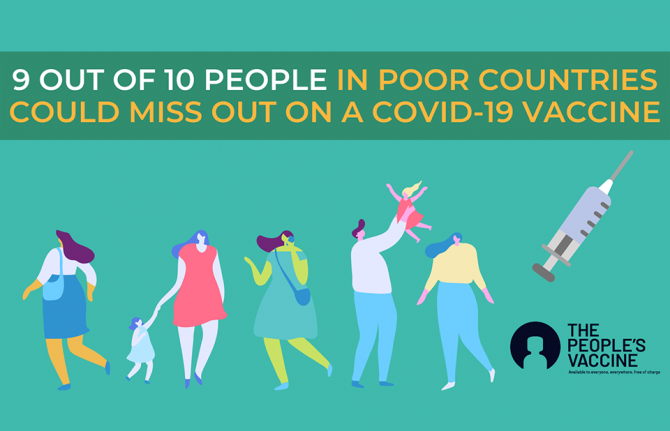

Opinion
We must have a #PeoplesVaccine, not a profit vaccine
09 December 2020
09 December 2020 09 December 2020By Winnie Byanyima, UNAIDS Executive Director
The first shots of the COVID-19 vaccine are being administered in the UK this week-a triumph for the British people and a remarkable achievement for all those involved. This historical event, celebrated, quite rightly with much relief and fanfare, shows just what can be done when investment and political will combine to overcome a public health threat. These efforts will undoubtedly save thousands, if not millions of lives.
Yet we are far from claiming victory. New statistics released today by the People’s Vaccine Alliance show that 9 out of 10 people in poor countries are set to miss out on COVID-19 vaccine next year. Once again poorer countries find themselves at the back of the queue and will have to watch many more of their people die before a vaccine becomes affordable for them.
This tragically echoes the early days of the AIDS response when treatment was only available to the rich while poorer countries had to wait years before they could offer their people the same life-saving medicine. This was an avoidable tragedy and we cannot let this happen with the COVID-19 vaccine.
Rich countries have acquired enough doses to vaccinate their entire populations nearly three times over next year. Indeed, rich nations representing just 14% of the world’s population have bought up 53% of all the most promising vaccines so far.
Our best chance of staying safe from COVID-19 is to have vaccines, diagnostics and treatments that are available for all. No-one is safe from COVID-19 until everyone is safe. The response to COVID-19 is reinforcing existing inequalities within and between countries and the global economy will continue to suffer so long as much of the world does not have access to a vaccine.
The current system enables pharmaceutical corporations use government funding for research but maintain monopoly on medicines keeping their technology secret to boost profits. As we learnt from the HIV crisis, this monopoly costs many lives. If history has taught us anything, it is that pharmaceutical corporations create and protect monopolies to maximise profits as a goal higher than improving public health.
Things are moving fast on the vaccine front, yet efforts to improve access to a vaccine are moving far too slowly. The Pfizer /BioNTech vaccine we have seen has already received approval in the UK and it is likely to receive approval from other countries, including the US and EU, within days. Two further potential vaccines, from Moderna and Oxford (in partnership with AstraZeneca) are expected to submit or are awaiting regulatory approval. The Russian and Chinese vaccines have announced positive trial results. Yet all of Moderna’s doses and 96% of Pfizer/BioNTech’s have been acquired by rich countries.
In welcome contrast Oxford/AstraZeneca has pledged to provide 64% of their doses to people in developing countries. However, despite their actions to scale up supply, they can still only reach 18% of the world’s population next year at most.
We must have a #PeoplesVaccine, not a profit vaccine. Unless urgent action is taken by governments and the pharmaceutical industry to make sure enough doses are produced, COVID will continue lay existing inequalities bare. Pharmaceutical corporations and research institutions working on Covid19 vaccines must share the science, technological know-how, and intellectual property related to the vaccines to maximise production by other quality producers. This will allow that enough safe and effective doses to be supplies to all who need the vaccines at the same time. And there is already a global mechanism that facilitates this sharing: the World Health Organization COVID-19 Technology Access Pool (C-TAP).
I remember the days of the creation of the Medicine Patent Pool for HIV medicines which resulted in production of millions of doses of affordable antiretrovirals that are currently used by people in developing countries. Therefore, we have an example to learn from and make C-TAP works for the millions awaiting a vaccine.
Governments must do everything in their power to ensure COVID-19 vaccines are made a global public good—free of charge to the public, fairly distributed and based on need not ability to pay. A first step would be to support South Africa and India’s proposal to the World Trade Organisation Council this week to waive intellectual property rights for COVID-19 vaccines, tests and treatments until everyone is protected.
The campaign for a #PeoplesVaccine is gaining momentum. Last week in the US, more than 100 high-level leaders from public health, faith-based, racial justice, and labour organizations, joined former members of Congress, economists and artists to sign a public letter calling on President-elect Biden to support a People’s Vaccine. In the EU, a broad coalition of health worker trade unions, NGOs, activist groups, students associations and health experts launched a European Citizens’ Initiative for a people’s vaccine.
Now is time for pharmaceutical companies and governments to step up and ensure that a COVID-19 vaccine is available to everyone, everywhere, free at the point of use. Only then will the world begin to turn the tide on the COVID-19 crisis and ensure that everyone can stay safe and prosper.
UNAIDS
The Joint United Nations Programme on HIV/AIDS (UNAIDS) leads and inspires the world to achieve its shared vision of zero new HIV infections, zero discrimination and zero AIDS-related deaths. UNAIDS unites the efforts of 11 UN organizations—UNHCR, UNICEF, WFP, UNDP, UNFPA, UNODC, UN Women, ILO, UNESCO, WHO and the World Bank—and works closely with global and national partners towards ending the AIDS epidemic by 2030 as part of the Sustainable Development Goals. Learn more at unaids.org and connect with us on Facebook, Twitter, Instagram and YouTube.



